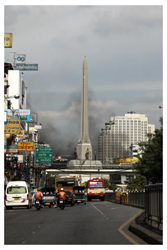Underground warfare – a lesson from the far South and the possibility of it happening in Bangkok
 By the News Desk
By the News Desk
Many analysts have concurred that the red-shirt movement has not ceased to exist once their leaders announced an end to the prolonged protest at Ratcharasong intersection which eventually culminated to arsoning and looting spree. They also believe that the government’s use of tough legal measures against the red shirts, such as the terrorism charge, will provoke an “underground war” against the state similar to the one which has been raging in the deep South.
The Isra news team recently conducted a brain-storming session in which several experts were invited to share their views on the current political conflicts and future prospects.
Mr Panyasak Sophonvesu, a researcher at the Institute of Security Studies Programme, Office of the Research Supporting Fund, said that even if the red-shirt protest ended, the war is not over yet and will continue. His view was also shared by Mr Kamnoon Sitthisamarn, a senator, who once said in the parliament that the current political conflict, no matter how it would be resolved, would change Thailand in a way as has never seen before as this was the first time that the rural people gathered in Bangkok in strength to carry out a prolonged struggle which ended in violence.
“The suffering of the red-shirt people will be exploited for endless political purposes because the fight between two largest political parties still continues and both have mass support on their side. The messages to be delivered to their mass supporters will come from different sets of thinking which will make it difficult for the conflict to be resolved in the short run.”
Mr Panyasak said that the red-shirt fight against the government would, from now on, would of the format once elaborated by Maj-Gen Khattiya Sawasdiphol, alais Seh Daeng, who said that in order to be able to overthrow the government, the red-shirt movement must have a political party, the support of the masses and an army of its own.
“Hence, the people who are still very angry with the government and cannot come up to fight openly against it may resort to underground warfare such as the one being waged in the deep South,” said Mr Panyasak
The analyst believes that the red-shirt movement has the potential to wage an underground war against the government because it has many well-trained men who may be retired or active army officers well versed in the use of war weapons with clear-cut chain of command. Nobody knows for sure how many of them are armed, but it is believed that their numbers exceed those under arrest.
However, he believes that it will not be easy for the armed elements to carry out sabotage attempts or urban warfare in cities as has been the case in the deep South because the people in Bangkok are diverse and are not supporters of any particular political group. Unlike in some of the provinces where most of the people are supporters of a particular political group and, therefore, the armed elements can easily operate or hide.
One issue which is of particular concern for Mr Panyasak is reconciliation. He noted that if reconciliation does not work in Bangkok, how can it work in the deep South since all the key advocates for reconciliation in the far South and in Bangkok are of the same group of people, among them Kothom Areeya.
Dr Pornthip Rojanasunan, director of the Institute of Forensic Science of the Justice Ministry, said she believed that the red-shirt protest and the arson attacks in Bangkok were well planned, well funded and supported as witnessed by the logistics system, rotation of protesters and the storing of arms. Based on the evidences collected, she said the arsoning and looting on May 19 were pre-planned.
However, she said that the events in Bangkok were totally different from those in the far South where there are religious and identity issues while the red-shirt movement is all about political conflict.
Dr Pornthip ruled out the possibility of the political conflict between the red-shirt movement and the government would degenerate into a war of insurgency as witnessed in the far South.
Pornpen Kongkachornkiat, director of Access to Justice and Legal Protection Programme of the Pasarn Wattanatham Foundation, said that the first priority was to ensure fairness for the arrested red-shirt people. Justice process must not be used as a tool to persecute them and that the process must be transparent and accountable, she said.
Pornpen believes that the use of terrorism charges against some of the suspects tends to worsen the conflict and fan the flame of hatred.
Mr Sitthipong Chantharaviroj, secretary-general of the Muslim Lawyers Centre, said that the use of legal process to expose truth is of importance. Without transparency and impartiality, more problems will result.
The lawyer also expressed concern of what he deemed as a double standard in the enforcement of special laws such as the emergency law. He noted that several people in the three southernmost provinces felt that the government had applied a double standard practice in the enforcement of the law in Bangkok and in the deep South.
Mr Yakob Raimanee, an imam of Pattani provincial mosque, warned against widespread use of terrorism charge against the red shirts. Citing the experience of the deep South, he said several people in the region had been falsely accused of being terrorists or bandits although they were not, so they reluctantly became one as accused.
He also suggested the government to be more open-minded and to open more media space for its opponents.
“Clearly, this is a war of hatred, anger and emotions. If the wound is not treated, it will futher infest leaving a deep scar like the Tak Bai massacre and the Krue Se mosque massacre,” said the imam.
